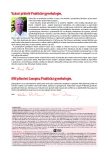Avastin in first-line treatment of metastatic breast cancer – our experiences: case report
Authors:
Vlastimila Čmejlová; Kateřina Kubáčková; Petra Pokorná; Darja Šustrová; Jana Prausová
Authors‘ workplace:
Onkologická klinika 2. LF a FN Motol, Praha, přednostka doc. MUDr. Jana Prausová, Ph. D., MBA
Published in:
Prakt Gyn 2013; 17(4): 319-322
Category:
Oncogynecology: Case report
Overview
Objective:
The review presents group of patients treated at the Oncology Clinic of the 2nd Faculty of Medicine and the Faculty Hospital Motol in Prague with combination of bevacizumab + paclitaxel in the first line of metastatic breast cancer in the last 12 months (September 2012 – September 2013) and assesses effectiveness, profile and side effects of therapy including impact on life quality.
Characteristics:
8 female patients with metastatic „triple negative“ breast invasive ductal carcinoma aged 34–68 years, median age 46 years, after adjuvant oncology therapy and subsequent relapse to distant organs; 1 patient had primary generalization, but for internal comorbidity was not suitable for anthracycline therapy, 2 patients completed rebiopsy to confirm histology. Other patients did not have rebiopsy due to less than 6 months period from administered adjuvant therapy. All patients were in good biological status ECOG 0–1. Metastases located in the liver, bone, lymph nodes, lungs, contralateral breast, CNS, retina, peritoneal cavity and ovary.
Methods:
paclitaxel + bevacizumab administered in 4 week mode – paklitaxel 90 mg/m2 D 1,8,15 a bevacizumab 10 mg/kg D 1 a 15 with steron, corticosteroid and antihistamine premedication.
Results:
Patients completed total of 67 chemotherapy cycles, median was 5 cycles: the highest number of cycles was 18, the lowest 3 cycles; from the 9th of September 2012 to the 31st of August 2013. Dosage of paclitaxel and bevacizumab was reduced by 25% in one patient for G3 neutropenia after the first cycle of chemotherapy. The longest duration of treatment until disease progression was 18 months, 3 months the shortest, with 4 months median. G3 haematotoxicity has been observed in only one case, anemia, proteinuria and neuropathy reached up to G2. The most severe side effect was bleeding from the gastrointestinal tract which ocurred in the longest treated patient (after 18 cycles) and it was reason to terminate the therapy. Currently, 4 patients have terminated the therapy for disease progression and 3 of them have already died, 4 patients continue with the therapy in the same mode and without reduction in dosage. Positive evaluation of therapeutic tolerance has been confirmed by all female patients and life quality has been maintained as well. Accurate statistical analysis with PFS and OS assessement is imposible due to the small group of patients with short period of time after the therapy.
Key words:
Avastin® – bevacizumab – metastatic breast cancer – first-line treatment
Sources
1. Robert NJ, Diéras V, Glaspy J et al. RIBBON-1: Randomized, double-blind, placebo-controlled, phase III trial of chemotherapy with or without bevacizumab for first-line treatment of human epidermal growth factor receptor 2-negative, locally recurrent or metastatic breast cancer. J Clin Oncol 2011; 29(10): 1252–1260.
2. Miles DW, Chan A, Dirix LY et al. Phase III study of bevacizumab plus docetaxel compared with placebo plus docetaxel for the first-line treatment of human epidermal growth factor receptor 2-negative metastatic breast cancer. 32nd Annual San Antonio Breast Cancer Symposium Location: San Antonio, TX DEC 09–13, 2009. J Clin Oncol 2010; 28(20): 3239–3247.
3. Miller K, Wang M, Gralow J et al. Paclitaxel plus bevacizumab versus paclitaxel alone for metastatic breast cancer. N Engl J Med 2007; 357(26): 2666–2676.
4. Petráková K. Avastin v léčbě karcinomu prsu. Klin Onkol 2011; 24(2): 101–105.
5. Lambrechts D, Lenz H-J, de Haas S et al. Markers of response for the antiangiogenic agent bevacizumab. J Clin Oncol 2013; 31(9): 1219–1230.
6. Petráková K, Palácová M, Vyskočil J, Macková D. Triple negativní karcinom prsu – chemorezistentní onemocnění? In: Edukační sborník: XXXIV. Brněnské onkologické dny a XXIV. Konference pro sestry a laboranty. Masarykův onkologický ústav: Brno 2010; 6 : 26–27. Dostupné z WWW: < http://toc.nkp.cz/NKC/201006/contents/nkc20102110841_1.pdf>.
7. Tesařová P et al. Triple negativní karcinom prsu a možnosti jeho léčby. AT Mediprint: Praha 2013.
Labels
Paediatric gynaecology Gynaecology and obstetrics Reproduction medicineArticle was published in
Practical Gynecology

2013 Issue 4
-
All articles in this issue
- Obstetrical anesthesia – Czech Republic versus world
- Stillbirth – persistent problem of perinatal care
- Pharmacological options to reduce blood loss in laparoscopic myectomy
- Pelvic exenteration and female sexuality
- Traffic injuries of the pregnant women
- Principles and results of National register of assisted reproduction
- Avastin in first-line treatment of metastatic breast cancer – our experiences: case report
- Expectations of expectant mothers versus the hospital reality in case the planned caesarean section
- Screening of sporadic colorectal cancer in Czech Republic
- Authors´index
- Reviewers´ index
- Key words index
- Organization of Medical Care in the Field of Assisted Reproduction in Ukraine (Myth and Reality)
- Practical Gynecology
- Journal archive
- Current issue
- About the journal
Most read in this issue
- Stillbirth – persistent problem of perinatal care
- Principles and results of National register of assisted reproduction
- Obstetrical anesthesia – Czech Republic versus world
- Traffic injuries of the pregnant women
